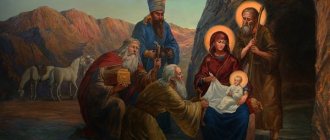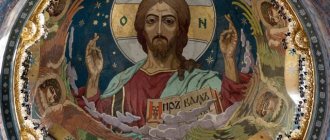Why did God show Abraham the sky and the sand? God told him: “I will make a great nation from you.” And we know that this nation is Israel. We also know that Jesus Christ, the Savior of the world, did not come as a representative of another people, but He came as a Jew. God blessed the people of Israel and separated them from other nations so that they could be His voice. He was His representative. God did this because He loved the whole world. God's purpose in separating Israel was for them to become God's example. Let us not forget what happened to the people of Israel. God wanted him to be under grace, but he boasted of his self-righteousness, his efforts. The Israelites told God at Mount Sinai: “Whatever God commands us, we can do it” ( Exodus 19:8)
.
This is despite the fact that they have not yet heard the 10 commandments. A person relies on his own strength, which he does not have. People asked for the law without even hearing it. They asked to give it, promising God that they would do everything He commanded. But all you see is a golden calf ( Exodus 32:8)
.
This tells us that being under the law does not produce holiness, but it does produce sin. Your intentions may be good, but the result will be bad.
So, for 1.5 thousand years they were under the law, and the best of them failed in fulfilling it. David also failed to keep the law.
Law condemns the best, grace saves the worst.
Jesus Christ - Savior of the world
Israel was under the law, and God dealt with them until they fell into idolatry, that is, they turned to pagan gods. Then God allowed the pagans to come. First to the Babylonians, then to the Persians and Medes, and then to the Greeks and Romans.
At a time when Rome ruled over Israel, in the small town of Bethlehem, Christ, the Savior of the world, was born.
God looked at the people of Israel and said, “I gave you priests, but you rejected them and killed them.”
God said, “I will send you prophets.” But they rejected the prophets and did not listen to the words of God delivered through the mouth of the prophets. Then they wanted a king. God told them, “Okay, I will give you a king.”
But they wanted a king not from God, but their own. As a result, King Saul failed miserably.
Priest, prophet, king - nothing succeeded.
Christ - Savior of the world, Son of God, Priest, Prophet and King
(Matt 12:24)
The Pharisees, having heard
this
, said: He does not cast out demons except by the power of Beelzebub, the prince of demons. Blasphemy against the Holy Spirit Contents of the tip
Jesus preached to the leaders of Israel. They rejected Him. In this chapter the Pharisees blasphemed the Holy Spirit and finally rejected Jesus Christ in His three-part glory. Jesus says of Himself: “Here is He who is greater than the temple.”
A temple is a place where priests serve. Thus He is greater than all the priests. The leaders continually rejected Him. Jesus preached about the kingdom, saying, “Repent, for the kingdom of God is at hand.” Jesus had not yet preached the gospel of grace, although he was full of grace and truth. The fullness of the revelations has not yet been revealed. Jesus opened the ears of the deaf, opened the eyes of the blind. He cleansed lepers, raised the dead, and loved children. He multiplied two fish and five loaves, and there was such abundance that there were twelve baskets of food left. Jesus Christ is the King, the Savior of the world in their midst. Despite all this, they rejected Him. But Jesus still loved them.
(Matthew 13)
Jesus left the house and went to the sea, and first spoke seven parables about the Kingdom of God.
Proverbs hide the truth from those who do not seek it. And reveals her wonderful treasures to those who thirst for her.
What does Christ have to do with the Russian Orthodox Church?
Behind this question there is often a paradoxical position - there is no God, but the Russian Orthodox Church has nothing to do with Him. But in order to pose this question on its merits, we must proceed from the fact that Christ, the Christ of the Gospels - there is no other and there is nowhere to take it from - is real. The Gospel speaks of Christ not as a long-dead teacher or founder of a philosophical school, or even a Prophet, but as a Risen and living Savior, with whom we, living now, can enter into a relationship of trust and obedience, into a Covenant, as Christ himself calls it .
The covenant that unites a person with Christ inevitably unites him with other people. You cannot be one of your own with Christ and alien to other people whom Christ accepted. If you are adopted as sons of God in Christ - and this is what Scripture says - then you have found not only a Father, but also many brothers and sisters.
Those who are in this Covenant constitute a community - a community that stretches through the centuries, from the time of Christ himself and the Apostles. In the Gospel, this community has a specific name - the Church. As Christ says, “I will build my church, and the gates of hell will not prevail against it” (Matthew 16:18) *.
Starting from the time of the Lord and the apostles, in all centuries, in I, II, IV, ... XI, XII, ... XX, XXI, the Church proclaims the same Gospel, and the testimony of Christ itself has reached us through this entire thickness of centuries solely thanks to Churches. The Russian Orthodox Church is part of the Universal Church, which dates back to the Baptism of Rus', an event that played a key role in the Christianization of the Eastern Slavs.
Christ says, “him who comes to Me I will in no wise cast out” (John 6:37). In Russia, the closest place where people gather who come to Him is the temple of the Russian Orthodox Church. To say that Christ has “no relation” to the people who cry out to Him would be to deny His direct words.
Proverbs
Every parable has a purpose.
1st Parable of the Kingdom
(Matthew 13:1)
That day he left the house...
In Scripture, "house" always represents Israel. Even Jesus' movements have meaning. In the Bible, every detail contains Divine meaning.
(Matthew 13:1)
Jesus sat down by the sea.
The sea in Scripture always represents the peoples of the world.
The Bible says that Jesus was crucified on the cross, the One who knew no sin. But on the cross He became an offering for sins, for our sins. The clouds cleared, the storm subsided, Jesus looked up, and behold, all the sins were laid upon Him, and He said, “It is finished!”
And again He turned to God: “Father, into Your hands I commend My Spirit.”
A comment!
And from that time on, no one was able to break a single bone of His body. God honored Him. He was laid in a tomb in which no one had been laid before. And on the third day He rose again. God accepted His sacrifice and we are all forgiven.
Basic teachings of Jesus Christ
| Believe in the Heavenly Father. | Throughout his entire earthly life, He never once called himself God, but only the son of God and man. |
| He inherited to Humanity a single prayer: “Our Father.” | Our Father who art in heaven! Hallowed be Thy name; Thy kingdom come; Thy will be done on earth as it is in heaven; Give us this day our daily bread; and forgive us our debts, as we forgive our debtors; and lead us not into temptation, but deliver us from evil. For Yours is the kingdom and the power and the glory forever. Amen. It contains the whole essence of His teaching, which is completely different from what other religions preach (they are much more complex, both before and now). |
| Communicate with the inner God, the Father. | Other religions have an external idol for worship. All the instructions of Jesus Christ teach us this communication. It is important to prepare your body and soul for his arrival. |
| "Commandments of Love": |
|
| "The Beatitudes": |
|
| Other commandments: |
|
| He taught about the conditions for entry into the Kingdom of Heaven. | The basis of Salvation is sincere faith in Jesus Christ and righteous Christian life. |
The Lord's teaching was supra-religious. He never argued about faith with others or about the existence of the Gods they worshiped.
Forgiveness and Justification in Jesus Christ
We are not forgiven because God just wanted it that way. We are legally forgiven. We are forgiven on a basis that no one can dispute. Someone paid for us. Jesus Christ did not have to come and die for us. The religious leaders rejected Him, but God gave them another chance. How did He do it? Jesus cried out on the cross: “Father! forgive them, they don’t know what they’re doing.”
Christ is the Savior of the world. Didn't they know they were driving nails into His hands and didn't they know they were rejecting Him? But Jesus found something they didn't know. They knew that they were hurting Him externally, but they did not know that they were hurting Him internally. He, seeing all their ignorance, said: “Father! Forgive them, for they do not know what they are doing.”
Thus, He brought them under the Levitical sin sacrifice. It was an offering where people sinned out of ignorance and a lamb was sacrificed.
Having said these words, Jesus protected the entire people with a sacrifice for sin through ignorance - He Himself became this sacrifice.
Followers of Christ leave Him
Many of Christ’s supporters also could not accept what He preached, it was so contrary to the usual norms and traditions. It is one thing to watch miraculous healings, and quite another to love the enemies of the Romans. Gradually, followers began to leave Christ, and even those who remained faithful found it difficult to fully understand and accept His teachings. Jesus tried again and again to instruct his disciples. He told parables in which everything was so familiar, so recognizable - the Samaritans, the Pharisees, the shepherds, the tax collectors. However, it was difficult for the apostles to understand the meaning of His allegories. The large crowds that had so recently surrounded Christ also began to thin out. Christ's heart was filled with pain. He came to tell people about love, which they did not yet know, which could change their whole life, but they did not understand it. Filled with sorrow, He mourned Jerusalem and the sad fate of his people, who did not know what they were rejecting.
Christ continued to teach people as before, but the content of His sermons had already become different. “From that time Jesus began to reveal to his disciples that he must go to Jerusalem and suffer many things from the elders and chief priests and scribes, and be killed, and on the third day rise again” (Matthew 16:21). The first time He told his disciples about this, they were shocked, for until now they had only talked about how they would be with the Teacher in the Kingdom of Heaven (Luke 24:21).
Jesus Christ - the Savior of the world has risen
Think about what God is like. He took the worst manifestation of human cruelty - the cross - and made it a means of saving people. God placed all judgment on His Son so that it would not fall on people. Jesus did not die on the cross; God raised Him from the dead on the third day. The king has risen! God gave Israel another chance. He sent Peter to preach to the Israelites and three thousand received salvation on the day of Pentecost. A few chapters after this, five thousand people were saved. How good it is that the people responded to the preaching of the Gospel. God gave them chance after chance.
Sermon of Peter and Stephen
Then Stephen came, who was filled with the Holy Spirit. He performed great wonders and signs among the people.
As Stephen preached, the leaders looked at Stephen's face, and it shone like the face of an Angel.
The age of the law began with a man with the shining face of Moses and ended with a man with the shining face of Stephen.
The leaders of the law boasted about the law. Stephen said: “None of you fulfilled it.” The Bible says that they became angry and were ready to kill him on the spot.
(Acts 7:55)
Stephen, being filled with the Holy Spirit, looked up to heaven and saw the glory of God and Jesus standing at the right hand of God, and said: Behold, I see the heavens opened and the Son of Man standing at the right hand of God.
He saw not only Jesus, but also the glory of God.
Why did Stephen see Christ standing?
The Bible says that Jesus Christ, the Savior of the world, rose from the dead and sat down at the right hand of the Father.
Here He stood because the Kingdom was still being offered to Israel. Israel was very close to experiencing the return of the King—Jesus. When Jesus returns, there will be a perfect life on earth. This will be heaven on earth, not only for Israel, but for all the nations of the world. There will be no more hospitals, courts and children will no longer die, there will be no more death.
The King will reign in His Kingdom. The Kingdom of God will cover the entire earth. So Jesus stood up, ready to return.
If the leaders would say, “Blessed is He who comes in the name of the Lord.” He would come back. That's why He stood. That's how close His coming was.
Instead, they covered their ears like children, then grabbed Stefan. They took him out of the city, threw him on the ground and took off his clothes, because they had hard work ahead of them. They laid their clothes at the feet of a young man named Saul. He was a Pharisee of the Pharisees. Saul approved of Stephen's murder. God made of this the greatest lawyer, the greatest apostle of grace that ever walked the earth.
In the following chapters the conversion of individuals occurs
(Acts 8)
appeal of the Ethiopian eunuch.
(Acts 9)
Paul's appeal. (Saul) on the road to Damascus.
(Acts 10)
Cornelius' appeal. Centurion of the Roman army.
How many sons did Noah have?
Ham. Sim. Japheth. Noah's three sons populated the earth.
After the death of Stephen in chapter 8, the mystery of the Church began. The coming of the Kingdom of God has slowed down. And so the secret of the Church began to be revealed. This mystery was in the heart of God. He always had a desire to have people who would form the body of His Son. The prophets of the Old Testament never knew about the Church, because the Church is a mystery.
- The Ethiopian eunuch turned to faith and accepted salvation. He is from the family of Ham.
- In the next chapter, Saul became Paul, accepted salvation. He is a Simite, from the clan of Shem.
- The Roman Cornelius is from the family of Japheth.
So Ham, Shem, Japheth are all saved in these three chapters.
Today there are no descendants of Ham, Shem, or Japheth. We are all in Christ. There are no more ethnic differences.
The Bible says that God, after raising Jesus from the dead, placed Him far above all authority.
If medicine has a name for your disease state, the name of Jesus is above that name. Before the name of Jesus, every disease bows.
And in fact?
There is a Latin phrase, Aut Deus Aut Malus Homo. It dates back to the medieval thinker Thomas Aquinas and means “Either God or a bad man.” The point is that the Jesus we meet in the Gospel says things that can only be considered good and moral if the religious message of the Gospel is true.
For example,
“Whoever loves father or mother more than Me is not worthy of Me; and whoever loves a son or daughter more than Me is not worthy of Me; and whoever does not take up his cross and follow Me is not worthy of Me. He who saves his soul will lose it; but he who loses his life for My sake will save it” ( Matthew 10:37-39).
We are talking about martyrdom - a disciple of Christ must be prepared to be rejected by those closest to him, and the image of carrying a cross for Jesus' listeners was painfully clear - those condemned were forced to carry the horizontal crossbar on which they would be crucified. Carrying a cross meant going to a cruel death. To lose your soul for the sake of Christ is to die for Him.
Crucifixion
And so Christ not only calls people to martyrdom for Him, but also promises that ultimately they will find eternal and blessed life.
Truly, truly, I say to you, whoever believes in Me has eternal life ( John 6:47).
This promise is either true or it is not - and if it is false, then there is nothing good or wise in calling people to martyrdom under false promises. The person who said the things that Jesus said is really either God who raises the dead or a bad person.
And Jesus himself is quite clear about who He is. He said that he was with the Father before the foundation of the world ( John 17:5), that He and the Father are one ( John 10:30), that it is He, Jesus, who will come to judge all nations on the last day ( Matthew 25:31).
He constantly makes it clear that in His person we meet God. It's either true or not; and if this is not true, then it is a very unkind untruth.
Jesus establishes at least two rites necessary for eternal salvation. Baptism:
Whoever believes and is baptized will be saved; and whoever does not believe will be condemned ( Mark 16:16).
and the Eucharist:
Jesus said to them, “Truly, truly, I say to you, unless you eat the flesh of the Son of Man and drink his blood, you have no life in you.” He who eats My flesh and drinks My blood has eternal life, and I will raise him up at the last day ( John 6:53,54).
Of course, in this case we are often told that the early Church attributed all these words to Jesus, who meant no such thing. Attempts to reconstruct the “historical Jesus” have been made many times, without much success - the moral teaching of Christ cannot be separated from His personality.
But in any case, we don’t have any other Jesus other than the Jesus of the New Testament - you, of course, may not believe the testimony of the Apostolic Church about Him, but then you have no opportunity to refer to Him.
In fact, when you say “Jesus simply taught to be kind,” who do you mean? Jesus of the Gospels or someone else? If the Gospels are true, then this is simply not true. In the Gospel, Jesus is distinctly religious, dogmatic, and ritualistic.
If we are talking about some other, constructed Jesus, obtained by compiling our chosen passages of the Gospel with our own considerations, then let's say so - this is some other Jesus, about whom the Apostles did not preach, and whom Christians did not know. But in this case it would be strange to refer to this artificial construction as a moral authority.










